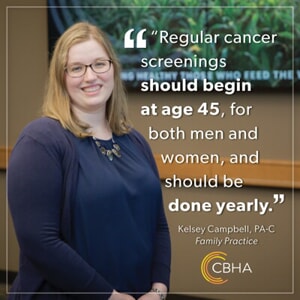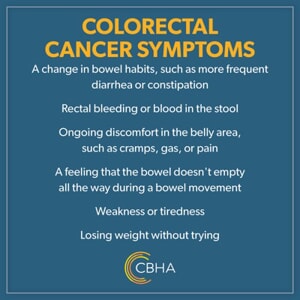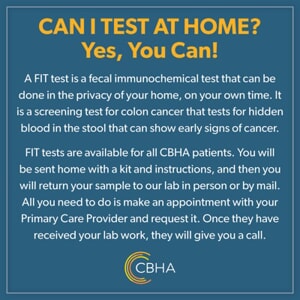The Importance of Colorectal Cancer Awareness

This month we want to bring awareness to Colorectal Cancer. This disease is the leading cause of cancer death in the United States, but there’s a way that we can stop that. Screenings can help save lives!
You may know this disease by its short name, Colon Cancer. Sometimes, abnormal growths, called polyps, form in the colon or rectum. Over time, some polyps may turn into cancer. Screening tests can find polyps so they can be removed before turning into cancer. Screening also helps find colorectal cancer at an early stage, when treatment works best.
WHEN SHOULD I GET A COLORECTAL SCREENING?
“Regular screenings should begin at age 45, for both men and women,” says Kelsey Campbell, PA-C. “And they should be getting screened for colorectal cancer yearly.” Kelsey also recommends that anyone younger than 45 who thinks they may be at high risk for colon cancer should speak with their provider about a screening.
Colorectal polyps and colorectal cancer don’t always cause symptoms, especially at first. That is why getting screened regularly for colorectal cancer is so important. If you’re concerned that you may have colon cancer, you can talk your PCP, and they can refer you to get a colonoscopy.
COLORECTAL CANCER SYMPTOMS
Some symptoms of colorectal cancer can include:
- A change in bowel habits, such as more frequent diarrhea or constipation.
- Rectal bleeding or blood in the stool.
- Ongoing discomfort in the belly area, such as cramps, gas, or pain.
- A feeling that the bowel doesn't empty all the way during a bowel movement.
- Weakness or tiredness.
- Losing weight without trying.
CAN I TEST AT HOME?
Yes, you can! A FIT test is a fecal immunochemical test that can be done in the privacy of your home, on your own time. It is a screening test for colon cancer that tests for hidden blood in the stool that can show early signs of cancer.
FIT tests are available for all CBHA patients. You will be sent home with a kit and instructions, and then you will return your sample to our lab in person or by mail. All you need to do is make an appointment with your Primary Care Provider and request it. Once they have received your lab work, they will give you a call.
If you have a family history of colon cancer or think you are at risk, make an appointment with your primary care provider. Call/text 509.488.5256 or schedule your appointment here.
Source(s):
www.cdc.gov/cancer/colorectal/basic_info/what-is-colorectal-cancer.htm